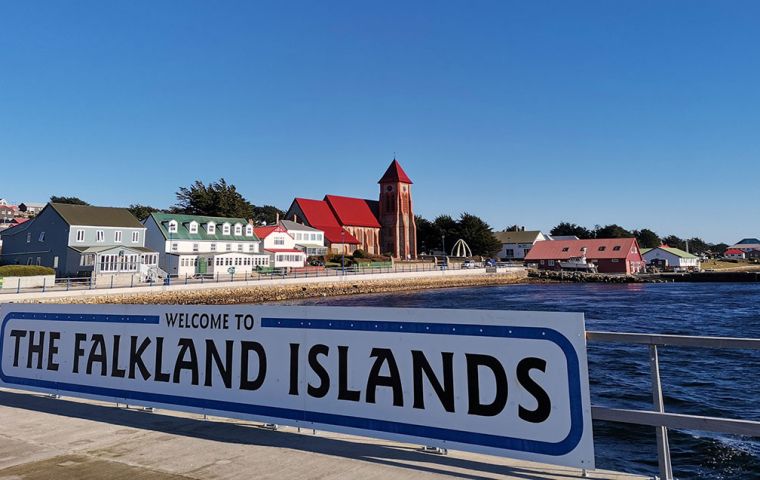MercoPress. South Atlantic News Agency
Falklands puts in practice quarantine options and warns about symptoms of Delta variant
 Convalescent cases will be eligible for early release after 5 or 8 days, depending on their vaccination status
Convalescent cases will be eligible for early release after 5 or 8 days, depending on their vaccination status Falkland Islands' Executive Council, ExCo, approved on Thursday a further change to quarantine measures for people travelling to the Falkland Islands by air with the introduction of a new 5-day‘ test to release’ option. This initiative was identified during the latest six-week review of quarantine arrangements, in line with the requirements of the Infectious Diseases Control Regulations 2020, as well as in light of the Covid-19 vaccination status of the community.
From 19 July 2021, the following quarantine requirements will apply to passengers arriving via the South Atlantic Airbridge:
• 5 day ‘test to release’ option: this scheme is only available for passengers who are fully vaccinated (have completed their full course of vaccination at least 14 days prior to flying) and can prove this by means of a vaccination card, approved app or letter from their doctor. They will be tested on day 2 (where they must provide proof of vaccination) and also on day 5. If both tests are negative, they will be permitted to leave quarantine.
• 8 day ‘test to release’ option: this scheme is available for passengers who are partially vaccinated, or non-vaccinated, or who are travelling with children (who themselves will not have been vaccinated). This scheme has been in place since 3 June and the steps remain the same – testing on day 2 and day 8. If both tests are negative, they will be permitted to leave quarantine.
• Both the 5 and 8 day ‘test to release’ options are voluntary, which means if an individual does not want to participate in either swabbing programme, then they must undertake a full 14 days of quarantine.
The only exemptions to this approach are people classified as a ‘convalescent case’. This is where someone has had an active Covid-19 infection within the past 90 days and has fully recovered. Convalescent cases are not a public health risk. Each case must provide proof of their previous Covid-19 infection in order to book their seat on the Airbridge, and will also require a medical assessment that is carried out to the satisfaction of KEMH, and which takes into account their disease and symptom history.
Convalescent cases will be eligible for early release after 5 or 8 days, depending on their vaccination status. Any exemptions are made on a case by case basis, are based on expert clinical opinion, and will be subject to monitoring on arrival.
Chief Medical Officer, Dr Beccy Edwards, said of the new option: “We have seen great success with the 8 day ‘test-to-release’ scheme, with everyone agreeing to be swabbed to enable an early release from quarantine. This next step is a proportionate one, as we are only offering it to people who have had a complete course of vaccine, and because our community itself is well-protected, following our own nationwide vaccination programme.
“As with all of our decision-making, these changes are based on the latest clinical research, advice from experts and by applying the local context here in the Islands. Everything is being very carefully managed, using a phased approach, and with the safety of our community at the forefront of our thinking. As we’ve said before, the pandemic is an evolving situation, and if any public health issues re-emerge or escalate, we can and will address them quickly.
“Critically, I would like to also remind the public that we still must remain vigilant in terms of other viral illnesses. Recently we have seen a number of very unwell people with fevers and who have been sneezing and coughing, but still attending work or school. Not only is it a good idea to self-isolate to prevent other people from catching your very grotty illness, but there is always the outside chance that it could be related to Covid-19. No medical test in the world is 100% accurate and the Delta variant – the UK’s most widely established strain of coronavirus – starts with cold-like symptoms. So, if you or your child has a fever, a new cough or other flu-like illness, including diarrhoea and vomiting, then please inform the hospital but don’t go into work or school. If we have learned nothing else from the pandemic it is that personal responsibility stops diseases spreading.”
What is not changing
• Passengers still require proof of a negative PCR test for Covid-19 no more than five days before arrival in Senegal when travelling via the South Atlantic Airbridge – except where an exemption has been made for a convalescent case
• People who test positive, and those they are quarantining with, must complete the full quarantine period of 14 days and may be asked to self-isolate for a further period after that, for example if they continue to have viral symptoms
• People in quarantine must not share their living accommodation or any facilities with anyone who is not in quarantine with them. You must not invite anyone into your accommodation who is not quarantining with you.
• On arriving in the Islands, people must travel directly to quarantine accommodation in government-designated transport or, if using a private vehicle, must travel alone or only with other people who are also going in quarantine
• Quarantine measures for people arriving in the Falkland Islands by sea remain the same, although these are currently under review





Top Comments
Disclaimer & comment rulesCommenting for this story is now closed.
If you have a Facebook account, become a fan and comment on our Facebook Page!